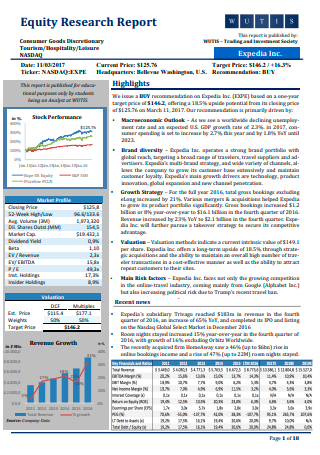In today's ever-changing financial landscape, investors are continuously seeking ways to boost their portfolios and increase returns. Equity analysis has turned into an integral tool for both experienced professionals and novice investors alike. By capitalizing on the knowledge of equity analysis specialists, individuals can gain a deeper understanding of market trends, discover lucrative opportunities, and make educated decisions that match their financial goals.
Equity analysis is more than just observing stock prices; it entails a comprehensive review of companies, industries, and economic indicators. Specialists in this field hold critical skills that equip them to assess the intrinsic value of stocks and evaluate potential risks. Whether it is through fundamental analysis, which focuses on financial statements, or technical analysis, which examines price movements, these experts provide valuable guidance that can change an investor's approach. Adopting their insights not only allows you to enhance your portfolio but also equips you with the knowledge to manage the complexities of the stock market.
Understanding Share Analysis
Equity analysis is a crucial method that helps traders assess the prospective outcomes of stocks. This process involves a thorough scrutiny of various factors that can affect a business' stock price. equity research report analyze financial statements, industry conditions, economic indicators, and leadership quality to form a holistic understanding of a firm's financial health and growth potential. By grasping these aspects, shareholders can make educated choices about purchasing or divesting shares.
One key element of stock analysis is the separation between basic and technical evaluation. Fundamental analysis centers around a company's financial status by examining its income, turnover increase, and general operating model. In comparison, technical analysis depends on past price fluctuations and trading activity to predict upcoming behavior. Both methods offer important perspectives, and merging them can improve the robustness of an trader's strategy.
Stock analysis is not just for professional participants or institutions; it is ever more available to retail investors who wish to augment their investment portfolios. With a plethora of tools available, including comprehensive reports and applications, individuals can find out to perform their own evaluations. Working with financial analysts can further refine one's approach, helping shareholders discover prospects and minimize threats while conforming their investment strategies with their financial aspirations. ### Key Metrics for Assessing Stocks
As assessing possible stock holdings, it is crucial to consider multiple key metrics that reveal a company's financial health and growth potential. One of the most important metrics is Earnings per Share (EPS), showing a company's profitability. A higher EPS indicates a highly profitable company, making it a favorable choice for investors. Keeping an eye on trends of EPS through several quarters may uncover growth patterns, helping investors to identify steady performers.
A further key measure is the Price to Earnings (P/E) ratio, which compares a company's current share price to its earnings per share. A reduced P/E ratio might indicate that a stock is undervalued, whereas a high P/E ratio may reflect overvaluation or high growth expectations. Investors ought to take into account the P/E ratio in the setting of the industry average, as different sectors can exhibit varying standards for what is a "normal" P/E ratio.
Lastly, the Return on Equity (ROE) is an integral metric that indicates how effectively a company is utilizing shareholders' equity to generate profits. An increased ROE indicates efficient management and a potentially lucrative investment. By examining these metrics, equity analysis specialists enable investors to make informed decisions and enhance their portfolios by identifying stocks that align with their financial goals.
Expert Techniques for Portfolio Management

One of the key methods employed by financial analysts specialists is diversifying across industries and investment types. This method helps mitigate potential losses and boosts the potential for profits. By allocating funds in a variety of sectors, analysts can protect against downturns in any single sector. This means that even if one part of the economy struggles, other investments can help maintain overall investment integrity.
Another important strategy involves regular adjustment of the investment mix. Equity analysis experts emphasize the need to regularly assess and modify the asset allocation in line with performance and market trends. This approach helps to capture profits and protect against excessive risk. Staying ahead of the curve allows stakeholders to react to economic shifts and adjust their portfolios with their long-term objectives.
Lastly, leveraging data analytics and information can significantly enhance investment decisions. Financial professionals utilize both basic and technical analysis to evaluate potential investments. By analyzing company reports, market trends, and past data, they can spot mispriced stocks and ideal entry points. This analytical strategy empowers investors to make informed decisions, ultimately transforming their investment performance.
